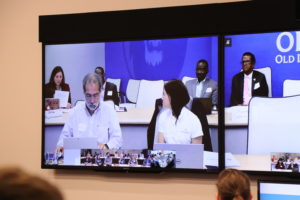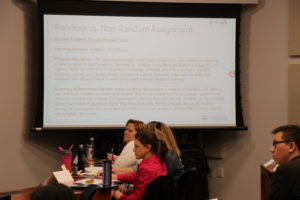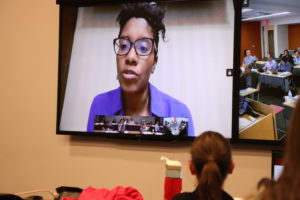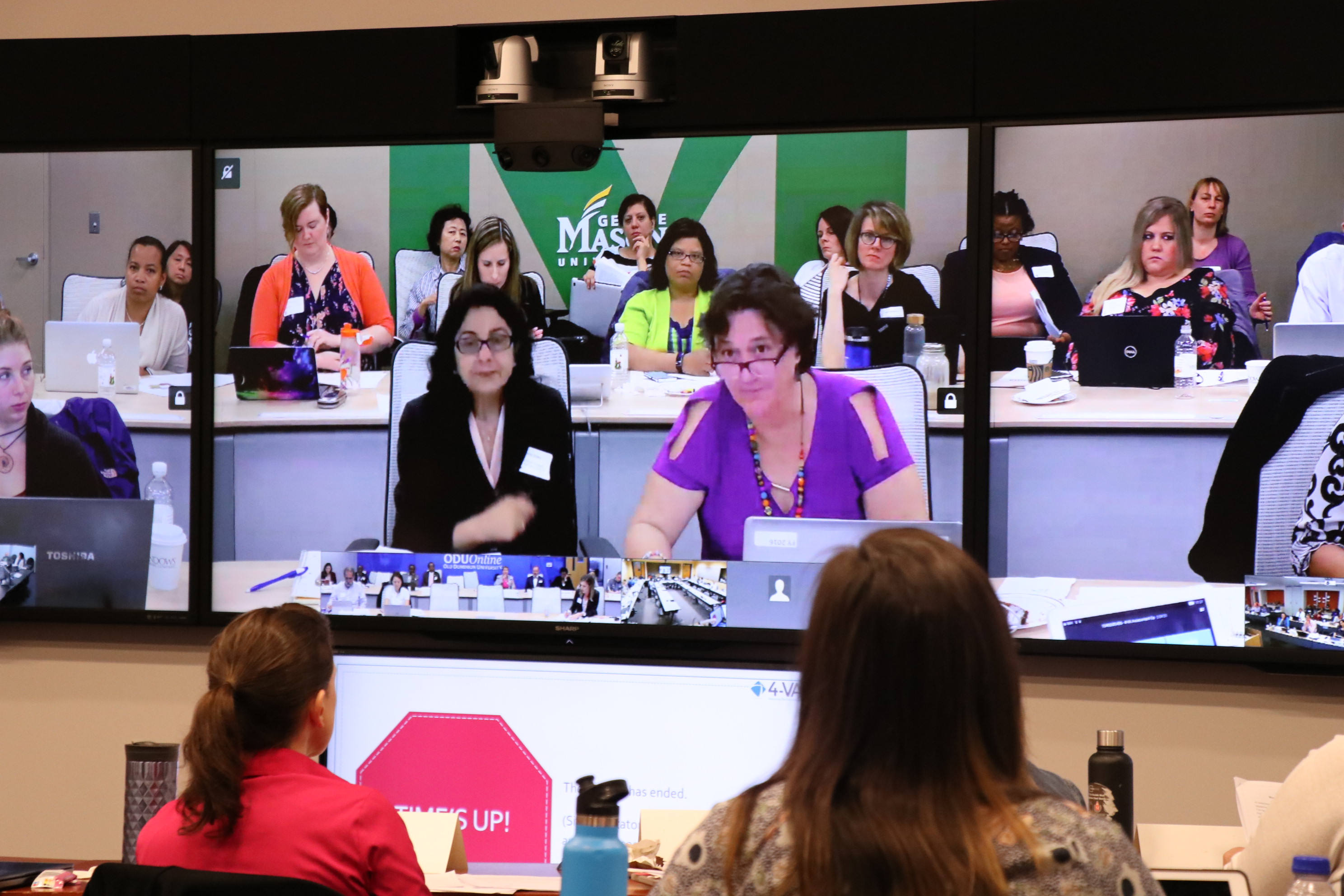In the largest and most widespread event that 4-VA has ever coordinated – including all six 4-VA partner schools — higher education assessment professionals from across the Commonwealth came together for a “virtual” meeting. The meeting took place in April using  telepresence technology at each of the 4-VA schools.
telepresence technology at each of the 4-VA schools.
Mason coordinator Stephanie Foster, Associate Director in the Office of Undergraduate Education, and her colleagues at the Virginia Assessment Group applied for and received a 4-VA grant to bring together assessment professionals from two- and four-year public schools, private schools, as well as alternative higher education institutions to offer advanced training for faculty and professionals who have responsibility for learning outcomes assessments in their institutions. Says Foster, “The idea for the drive-in came from a self-study of the Virginia Assessment Group’s professional development offerings. We wanted to increase participation for our community college colleagues, and travel cost was identified as a barrier to their participation. One of our board members had an idea to use the 4-VA telepresence technology to host a virtual workshop. Because it was a free event, and no participant needed to travel more than an hour to get to their closest 4-VA site, the Virtual Drive-in served a wider audience.”
The all-day workshop provided critical training on best practices in data collection, analysis, and reporting. Facilitators at each location oversaw collaborative activities to encourage partnership and sharing of innovative practices. “Telling our stories: Using assessment data for  learning and improvement” was an instant success, with 168 conference registrants representing 50 organizations: 31 universities, 15 community colleges, and 4 professional organizations. The event was funded by a 4- VA Collaborative Research Grant and organized by the nonprofit Virginia Assessment Group.
learning and improvement” was an instant success, with 168 conference registrants representing 50 organizations: 31 universities, 15 community colleges, and 4 professional organizations. The event was funded by a 4- VA Collaborative Research Grant and organized by the nonprofit Virginia Assessment Group.
Says Foster, “Good assessment is essential to our practice as educators, and many programs are doing it well. Across the field, we are striving to improve how we share what we learn with faculty and institutional leaders so that assessment work can contribute to improving curriculum and instruction for student success.”
The day-long conference agenda involved input from each of the six locations. The conference began with a welcome from the Virginia Assessment Group president, Ryan Otto (Roanoke College) at the Virginia Tech location, and review of agenda by Kelsey Kirland from Old Dominion University. The morning workshop was presented by James Madison University Assessment and Measurement doctoral students, Andrea Pope and Caroline Prendergast; Psychological Sciences master’s student, Morgan Crewe; and JMU faculty member, S. Jeanne Horst. The morning workshop, entitled “Can we back up that claim? Making important data collection design decisions” addressed the appropriate inferences that can be drawn from assessment data collection designs. The workshop began with a description of the gold standard, randomized control trial, followed by a “let’s get real” section highlighting the real-world data collection challenges that assessment practitioners face. Participants grappled with how to make appropriate inferences from the data collection designs that are possible given common constraints. The morning concluded with participants from each location providing suggestions for ways of dealing with practical challenges related to data collection.
description of the gold standard, randomized control trial, followed by a “let’s get real” section highlighting the real-world data collection challenges that assessment practitioners face. Participants grappled with how to make appropriate inferences from the data collection designs that are possible given common constraints. The morning concluded with participants from each location providing suggestions for ways of dealing with practical challenges related to data collection.
The afternoon workshop, entitled “Evidence-based storytelling,” was facilitated by Jodi Fisler (State Council of Higher Education for Virginia), and Gianina Baker (National Institute for Learning Outcomes Assessment – NILOA). Participants viewed a video produced by Jillian Kinzie (NILOA), illustrating examples and rationale for presenting assessment findings that tell the story of student learning. Participants engaged in an activity in which they tailored a data report to a particular stakeholder audience. Gianina Baker closed the afternoon, providing reflections and suggestions for effective evidence-based reporting.
and Gianina Baker (National Institute for Learning Outcomes Assessment – NILOA). Participants viewed a video produced by Jillian Kinzie (NILOA), illustrating examples and rationale for presenting assessment findings that tell the story of student learning. Participants engaged in an activity in which they tailored a data report to a particular stakeholder audience. Gianina Baker closed the afternoon, providing reflections and suggestions for effective evidence-based reporting.
It was clear throughout the day, that connections were being made at the individual sites, and also from site to site. Attendee Adrienne E. Sullivan, Director of Accreditation in the College of Education and Human Development at Mason put it this way, “For me, the opportunity to meet and chat with other colleagues from Mason was great. (But) The highlight was to meet colleagues from other local higher education institutions and learn how they implement and handle assessment data collection was really fabulous. It made me feel that we are not alone in the struggle to find an efficient way to collect data!”
Written with contributions from S. Jeanne Horst, JMU. and Stephanie Foster, Mason. Photo credit: Kim Reedy, JMU

